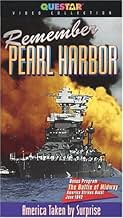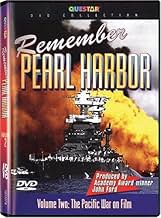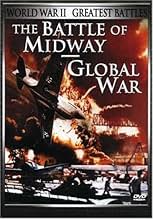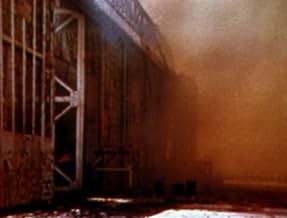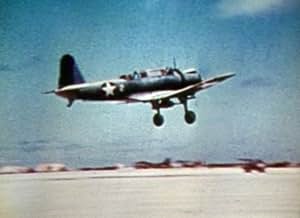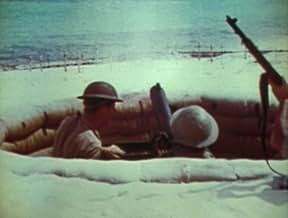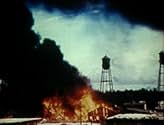IMDb-BEWERTUNG
6,1/10
2398
IHRE BEWERTUNG
Füge eine Handlung in deiner Sprache hinzuThe Japanese attack on Midway in June 1942, filmed as it happened.The Japanese attack on Midway in June 1942, filmed as it happened.The Japanese attack on Midway in June 1942, filmed as it happened.
- Regie
- Drehbuch
- Hauptbesetzung
- 1 Oscar gewonnen
- 1 wins total
Henry Fonda
- Narrator
- (Synchronisation)
Jane Darwell
- Narrator
- (Synchronisation)
James Roosevelt
- Self - US Army Major
- (as Major Roosevelt)
Donald Crisp
- Main Narrator
- (Synchronisation)
- (Nicht genannt)
Irving Pichel
- Narrator
- (Synchronisation)
- (Nicht genannt)
Jimmie Thach
- Self - Naval Aviator
- (Nicht genannt)
Empfohlene Bewertungen
This short piece of film shows parts of, as the title already tells us, of the battle of Midway, and some moments after it. The director is John Ford and what he creates with this short documentary is pure Hollywood war propaganda. There is a storyline that even includes the women at home waiting for the fighters. During some scenes a dialogue between Jane Darwell and the great Henry Fonda is heard on the background.
The images of the battle, shot in color, have historic value and are pretty exciting. The heroic tone is easy to understand, although now it is easy to see past that. Everything, including its Oscar win, seems to be there for propaganda purposes, making the people at home feel good enough about the war that is going on. In the end 'The Battle of Midway' is an interesting little film, but not that much more.
The images of the battle, shot in color, have historic value and are pretty exciting. The heroic tone is easy to understand, although now it is easy to see past that. Everything, including its Oscar win, seems to be there for propaganda purposes, making the people at home feel good enough about the war that is going on. In the end 'The Battle of Midway' is an interesting little film, but not that much more.
10llltdesq
This incredible compilation of footage won an Academy Award. It was shot by a crew of war cameramen that included John Ford, who I understand actually took some of the footage himself! While watching this, remember that you generally can effectively aim either a camera or a weapon at any one time, but not both and, as a cameraman has his eye to the lense while shooting, that means that he's exposed to all of the nasty stuff flying all around him with little or no cover! That's called "grace under pressure". They got an Oscar and deserved a medal! Highly recommended.
There have been many battles in the Second World War that played a part in deciding who the victors of the conflict were going to be, and one of these engagements is known as the Battle of Midway. Like any good ww2 film, this short combines good narration with impressive archive footage that was taken while the battle was ongoing. If that weren't enough, John Ford, one of the greatest geniuses in cinema history, directed this. The film starts with the narrator, Donald Crisp, telling the audience where Midway Island is located and why it holds such significance to the United States military. The film then goes on to show footage of the event that has often been cited as one of the most successful military engagements ever. At Midway, Japanese forces took 20 times the amount of casualties the Americans did, and american carrier aircraft managed to sink all 4 of the aircraft carriers responsible for attacking Pearl Harbor half a year earlier. This all took place only in June 1942, but even just 6 months into America's involvement in the war, they dealt a blow to japan from which they never really recovered. The footage of this event that Ford captured is remarkable because he was so close to the action. Many marines and other servicemen were killed on the island as japanese planes attacked from every conceivable angle, but Ford kept filming. You can see proof of this at one part where the camera gets knocked over by some kind of explosion. Aside from the exciting footage of combat and naval warfare, there isn't too much else to this short. It deserves praise because John Ford risked dying in action in order to record most of it, but at the same time, it's been eclipsed by a lot of other world war 2 related films that also showcase footage of this battle. What makes this one stand out after so many decades is the fact that its director was actually there in the midst of it, something that no modern documentary can boast. Because of this (and the huge interest I have in ww2 things) I have to consider Battle of Midway as one of the most iconic and well made second world war films. It goes without saying that this won an Oscar as well.
This documentary, "The Battle of Midway," is a short film shot during the actual combat on June 4, 1942. The Battle lasted from June 3 to June 7, but the air attack on Midway Island was on June 4. This shows the bombing of the U.S. airfield and positions on Midway. It also shows the defenders in action, and one Japanese plane trailing smoke after it was hit by ground fire.
What is most striking about this film is the concussion of the actual bombs, which have a horizontal spreading impact with huge destruction. What one sees in most movies in which battle scenes are staged, is ground explosions that blow up laterally and dissipate in the air with much less near damage.
Hollywood's John Ford was a Navy officer who directed this and other films for the Navy during WW II. Henry Fonda is the principal narrator. There isn't much by way of aerial combat or Japanese aircraft pictured here. Other Armed Forces photography would capture that. But this documentary earns its stars for the men who shot the film while under heavy enemy fire.
What is most striking about this film is the concussion of the actual bombs, which have a horizontal spreading impact with huge destruction. What one sees in most movies in which battle scenes are staged, is ground explosions that blow up laterally and dissipate in the air with much less near damage.
Hollywood's John Ford was a Navy officer who directed this and other films for the Navy during WW II. Henry Fonda is the principal narrator. There isn't much by way of aerial combat or Japanese aircraft pictured here. Other Armed Forces photography would capture that. But this documentary earns its stars for the men who shot the film while under heavy enemy fire.
Battle of Midway, The (1942)
*** (out of 4)
Henry Fonda and Donald Crisp add narration to the battle scenes shot by John Ford where the director was even wounded by enemy fire. There's really no story being told in this documentary but instead we just see a part of history in beautiful Technicolor. God knows everyone has seen countless war films but there's something unique seeing real ones here. They certainly look a lot different than what we've seen in countless fake movies.
Ford's World War 2 shorts are out there in various forms ranging from public domain companies to the Ford at Fox set. Quality various but the version in the Fox set is the best.
*** (out of 4)
Henry Fonda and Donald Crisp add narration to the battle scenes shot by John Ford where the director was even wounded by enemy fire. There's really no story being told in this documentary but instead we just see a part of history in beautiful Technicolor. God knows everyone has seen countless war films but there's something unique seeing real ones here. They certainly look a lot different than what we've seen in countless fake movies.
Ford's World War 2 shorts are out there in various forms ranging from public domain companies to the Ford at Fox set. Quality various but the version in the Fox set is the best.
Wusstest du schon
- WissenswertesDirector John Ford and cinematographer Joseph H. August were wounded by enemy fire while filming the battle.
- Zitate
Main Narrator: Midway Island. Not much land right enough, but it's our outpost. Your front yard.
- VerbindungenEdited into Ils ont filmé la guerre en couleur (2000)
- SoundtracksAmerica, My Country Tis of Thee
(1832) (uncredited)
Music by Lowell Mason, based on the Music by Henry Carey from "God Save the King" (1744)
Words by Samuel F. Smith
Played in the score and later sung by an offscreen chorus
Top-Auswahl
Melde dich zum Bewerten an und greife auf die Watchlist für personalisierte Empfehlungen zu.
Details
- Laufzeit18 Minuten
- Sound-Mix
- Seitenverhältnis
- 1.37 : 1
Zu dieser Seite beitragen
Bearbeitung vorschlagen oder fehlenden Inhalt hinzufügen



